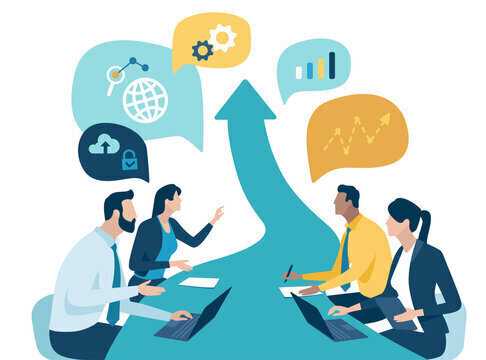The government's roadmap for a low-carbon sector: a first step in the right direction
At the beginning of July 2023, the Haut Conseil pour le Numérique Eco-Responsable (HCNE) (French High Council for Digital Sustainability) convened, bringing together numerous stakeholders as well as members of the government concerned by the issue: Jean-Noël Barrot, Minister for Digital Transition and Telecommunications, Agnès Pannier-Runacher, Minister for Energy Transition and Christophe Béchu, Minister for Ecological Transition and Territorial Cohesion.

The role of this High Council? "To be a steering body for ecological planning on the subject of responsible digital."
It was in this context that the decarbonization roadmap for the digital sector was presented. Drawn up by players in the sector, it is structured around action proposals, decarbonization levers that decision-makers will then be able to select for the final roadmap, which will be incorporated into the National Low-Carbon Strategy (SNBC) in 2024. This action plan echoes all that fruggr is undertaking and all that we are recommending to our stakeholders, and shows that the government today supports this approach to digital responsibility. However, we're still at the first stage, that of the roadmap. How can the government go further in its trajectory to contribute concretely to the decarbonization of the digital sector?
Jérôme Lucas, co-founder of fruggr, takes a closer look.

A digital decarbonization action plan built on 10 pillars
The roadmap has the merit of tackling all the key aspects of the environmental impact of digital technology, starting with that generated by terminals, data centers and networks.
As a reminder, in France, the digital sector accounts for 10% of electricity consumption (equivalent to 50 TWh per year) and 2.5% of the carbon footprint (or 17 MtCO2eq per year). Although these impacts are mainly attributable to devices such as smartphones and computers (their manufacture generates up to 64% of the digital sector's carbon footprint), data centers also play a significant role (contributing 16% of the carbon footprint and 22% of final energy consumption), while networks occupy third place (representing 5% of the carbon footprint). But above all, it's our uses that dictate renewal (new functions, software or performance requirements necessitating the purchase of new hardware).
And that's why, if nothing is done, we can expect this footprint to triple by 2050, according to the ADEME-Arcep prospective study published in early 2023.
In response to this observation, the roadmap resulting from the work of players from across the digital value chain is structured around 10 action levers:
- Influencing the terminal design and manufacturing phase
- Integrating the Internet of Things (IoT) into the roadmap
- Extend service life and reduce consumption
- Adopting a data center strategy
- Taking better account of end-of-life equipment
- Promote transparency (through reliable environmental data)
- Promoting eco-design
- Adopting a network strategy
- Encouraging sober use and developing training
- Identify use cases for decarbonizing other sectors (agriculture, construction, waste management, transport, etc.).
- Taking action against obsolescence
A number of more specific actions are derived from each of these areas, within which we find the principles that constitute the core values of Digital Sustainability : sobriety, eco-design and optimization. They also echo many of the recommendations made in the RGESN guidelines, particularly on the issue of hosting digital services.
EcoNum, ADEME's call for projects to foster innovation in the digital decarbonization sector
The presentation of this roadmap was accompanied by the presentation of other initiatives, such as ECONUM. This call for projects, supported by ADEME, aims to encourage the emergence of innovative projects designed to reduce the environmental footprint of digital technology through :
- The eco-design of digital goods and services to meet the challenges of depleting abiotic resources (fossil fuels, minerals and metals) and rare resources, including critical raw materials;
- Reuse, repair and reconditioning to extend the life of equipment
- Responsible production models, notably the economy of functionality and Low Tech, to encourage the development and deployment of "just-in-time" goods and services.
Aimed at major groups, startups and local authorities alike, this type of initiative demonstrates the government's growing commitment to the issue of digital sobriety, while at the same time enabling digital players to tackle the subject head on.
The need to project further ahead in the digital transition trajectory
As a Digital Sustainability expert, fruggr's publishing house, digital4better, already recommends all these proposed actions to our customers involved in a Responsible Digital approach. As a player in the field of positive digital impact, we welcome this initiative by the government, which is only the beginning of the trajectory.
Beyond "tracks" and "proposals", a roadmap can only be useful and effective through deployment with concrete materiality and a well-defined timeframe. Just as the REEN Act puts us on the right track, but implies no sanctions, can the action plan to be deployed under the SNBC measure up to the stakes?
There's no doubt that digital players need to embark on a trajectory of sobriety with regard to the services and equipment they create and use. Getting in touch with stakeholders, experts and players in the Responsible Digital Sector is the first step in accelerating the reduction of your digital footprint. Dedicated support and the use of a global analysis solution enable you to concretely assess your level of maturity on the subject, before undertaking concrete actions, such as designing eco-designed services, implementing an IT purchasing policy, optimizing existing websites or reconditioning your digital equipment.
It's also important to point out that while the proposed digital decarbonization roadmap is rather comprehensive, only certain actions will be retained by the government: yet Digital Sutainability is a concept within which no element should be omitted. We therefore hope that the government will incorporate an ambitious decarbonization roadmap for the digital sector into the National Low-Carbon Strategy 2024, and address all the essential aspects it addresses. In this instance, although this project is focused on decarbonization, the approach to a more responsible digital must not dispense with a fundamental element that is intrinsically linked to the environmental: the social footprint of digital.
A digital transition plan that omits the social footprint
Although this is a digital decarbonization plan that the government is tackling (limited, therefore, to the question of the impact of digital technology on the environment), it's necessary to mention the big omission in the digital transition: the social aspect. Just as in France we speak more of a "climate emergency" where other countries rightly evoke a "socio-ecological emergency", the question of the impact of digital technology on individuals should not be underestimated. Thinking about a low-carbon future is meaningless if it doesn't include the social and societal aspects it necessarily implies.
Responsible Digital is concerned with issues that are central to tomorrow's digital world: that of ethics (notably through the risks posed by AI), inclusion, accessibility and data protection. Although the government is addressing these issues in parallel projects and through regulations, they should not be separated from the national digital transition trajectory.
Finally, the roadmap refers to the accelerated rollout of 5G and the use of AI, which may find themselves at odds with the issue of digital sobriety. While the digital industry must adopt a critical and attentive approach to the digital transition, it is nonetheless essential to support these new initiatives. They play a vital role in advancing attitudes to digital responsibility, as well as encouraging organizations to implement technological innovation that takes into account the environmental and social impact of digital technology.
Jérôme Lucas, co-founder of digital4better
